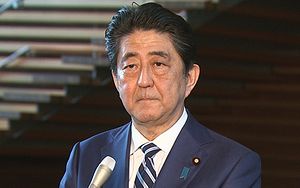The government scandal relating to the sale of land for a school with ties to Prime Minister Shinzo Abe’s wife continued to deepen this week, throwing the political futures of Abe and his Cabinet ministers into question.
Osaka-based ultranationalist education provider Moritomo Gakuen was planning a new elementary school on land owned by the aviation bureau, a subsidiary of the Ministry of Land. Somehow, the group was able to receive an 86 percent discount on prime real estate when purchasing the land. The latest developments are part of succession of damning evidence revealing a trail of government cover ups relating to the sale.
On Wednesday, an Osaka Finance Bureau was accused of instructing the West Japan Civil Aviation Bureau to inflate the estimates for underground waste disposal figures, adding millions to the overall cost. Details emerged from an anonymous source that in 2016 a ministry official arranged for the volume of waste removed to be bumped up and proposed the idea that the cost — originally estimated at roughly $1 million — should be pushed up to $7.5 million.
During a House of Chancellors finance meeting on Thursday, Mitsuru Ota, head of the Finance Bureau, explained he had only just been made aware of the allegations and didn’t know the facts of the case. He promised to lodge a report after an internal investigation. The Osaka District Public Prosecution’s Office, which is currently investigating the improper sale of public land, also obtained a similar testimony.
Meanwhile, on Tuesday, the Finance Ministry confessed to urging Moritomo Gakuen to prepare a fake explanation for the discounted price. The unfolding details pin the government to a scheme dating from last year to devise matching alibis to justify the discounted land deal by pointing to enormous underground waste removal costs.
According to Ota, in order to iron out any inconsistencies in both their official stories, a staff member phoned Moritomo Gakuen’s lawyer last year on February 20 to request a statement saying thousands of dump trucks were used to dispose of soil. The Ministry staff member went as far as suggesting ways to phrase and recount the story behind the falsified costs.
Abe has become the face of an unraveling exposé of government inconsistencies related to the Moritomo Gakuen land sale. Adding to his political woes, in the last seven days Abe has also been slammed with revelations of a cover up of the Self-Defense Force’s daily logs from Iraq, calling in personal favors for a new university vet department, and pressuring Moritomo Gakuen for a signature confirming the existence of conflicting land prices. Abe’s political career hangs by a thread and his administration’s ability to handle public administration and in particular public documents has been cast into serious doubt.
Constitutional Democratic Party member Kiyomi Tsujimoto said the deepening scandal was “jaw dropping,” having surpassing her imagination and morphed into a “bottomless swamp.” Politician Teruhiko Mashiko of the main opposition Democratic Party raised suspicions over whether the Ministry of Finance acted alone and emphasized the need to get to the bottom of who is behind the cover up and for what reasons. He stressed unless there is an overhaul of the current Finance Ministry, the department will contradict the separation of powers.
Abe is used to brushing government impropriety under the rug with an apology and a vow to prevent fraudulent cover ups from ever happening again. However, this time the public frustration circling Abe and his cabinet ministers has passed the stage of forgiveness.
The lack of information and urgency from the government sparked demonstrations in Tokyo; Japanese national public broadcaster NHK reported a crowd of furious protesters had gathered in front of the Prime Minister’s Residence and the National Congress Building demanding the truth. One protester retorted that “the problem just won’t come to an end.” Another said she was beyond angry and dumbfounded. Japan “shouldn’t be a country where you don’t know what to believe,” she fumed.
According to NHK’s latest public opinion poll, taken over three days last week, Abe’s approval fell six percent to a bleak 38 percent, while disapproval ratings hovered at 45 percent.

































